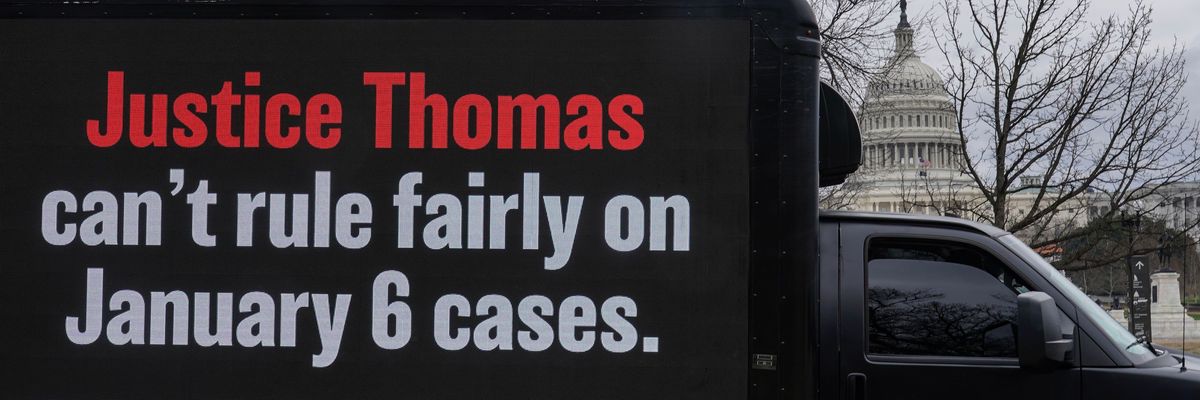U.S. Supreme Court Justice Clarence Thomas, who once went a full decade without speaking during oral arguments, asked the first question Thursday as the high court heard a case challenging former President Donald Trump's eligibility to run for a second White House term.
But Thomas, whose initial question focused on whether the 14th Amendment is "self-executing," shouldn't even be involved in the case, progressive watchdogs and other observers argued, given his wife Ginni's role in far-right efforts to overturn the results of the 2020 election—an effort that culminated in the January 6, 2021 insurrection.
"The Supreme Court is facing its most significant electoral test since Bush v. Gore. The stakes are high, and the American people should be able to trust that this case will be decided without outside influence," Tishan Weerasooriya, senior associate of policy and political affairs at Stand Up America, said in a statement shortly before oral arguments kicked off Thursday.
"Justice Thomas should recuse himself from this monumental case," Weerasooriya added. "Ginni Thomas' involvement in the seditious conspiracy that led to the January 6 insurrection is a bald-faced conflict of interest. If Thomas refuses, it will not only be a blatant denial of impartial review but also a rejection of Chief Justice [John] Roberts' recently issued Code of Conduct."
That code states that "a justice should disqualify himself or herself in a proceeding in which the justice's impartiality might reasonably be questioned." A University of Massachusetts at Amherst survey released Wednesday found that 64% of U.S. voters believe Thomas should recuse from any case related to the 2020 election given his wife's role in trying to subvert the results.
Will Bunch, a columnist for the Philadelphia Inquirer, argued that Thomas' failure to recuse from the case on Trump's eligibility "is a giant middle finger to American democracy."
"It's no wonder public trust in the court is terrible. Corrupt Thomas should resign."
The case in question, Trump v. Anderson, stems from the Colorado Supreme Court's December ruling that Trump engaged in insurrection and is thus disqualified from running for federal office again under Section 3 of the 14th Amendment. Trump quickly appealed the decision to the U.S. Supreme Court, which agreed to an expedited review of the case amid the 2024 presidential primaries.
Just over a week after the Colorado Supreme Court handed down its ruling, Maine's secretary of state moved to disqualify Trump from the 2024 primary ballot—a decision that was paused by a state judge pending the U.S. Supreme Court's ruling in Trump v. Anderson.
As oral arguments in the case proceeded Thursday, Rep. Bill Pascrell Jr. (D-N.J.) wrote that "Clarence Thomas is participating in a Supreme Court hearing today on Donald Trump's eligibility after trying to overthrow the government even though Thomas' wife conspired to help Trump."
"It's no wonder public trust in the court is terrible," Pascrell continued. "Corrupt Thomas should resign."
Citizens for Responsibility and Ethics in Washington (CREW), which filed an amicus brief in Trump v. Anderson supporting the former president's disqualification, noted in an analysis released earlier this week that Colorado and Maine are "the only two states that have substantively grappled with whether the 14th Amendment bars Trump from the ballot and reached a final decision based on the merits."
"Other individuals and groups have brought ballot eligibility challenges in other states across the country, some of which are pending and many of which have failed," CREW observed. "None of the cases that have been dismissed reached the stage where a court heard evidence and ruled on the merits, which includes questions of whether Trump is an insurrectionist and whether the 14th Amendment applies in his case."
